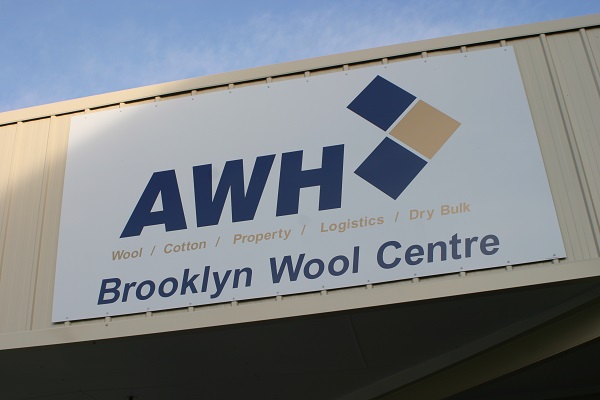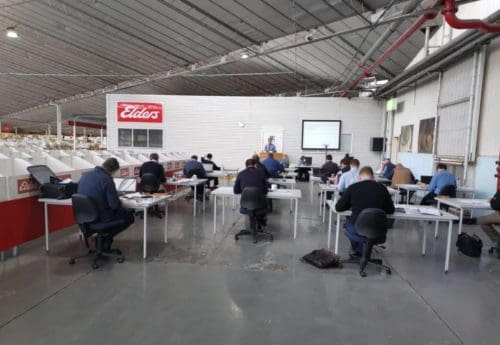
Wool auctions are to cease at the Brooklyn Wool Centre in Melbourne.
MELBOURNE’S wool auctions have been ordered out of the Brooklyn selling centre as part of Victoria’s Stage Four COVID-19 lockdown.
Sheep Central has been told the industry is currently seeking government approval to relocate the auctions to another location, possibly in Lara, between Melbourne and Geelong.
The weekly Melbourne wool auctions are held at the AWH Brooklyn Wool Centre close to a number of COVID-19 outbreaks in west Melbourne.
The negotiations for an alternative auction location began yesterday after the Victorian Department of Agriculture told Australian Wool Exchange chief executive officer Mark Grave that open cry wool auctions should be handled ‘remotely’.
In an email update, AWEX National Auction Selling Committee secretary David Cother advised brokers, buyers and service providers yesterday that the department told Mr Grave open cry wool auctions in Melbourne are considered as an ‘Auction House’ and not a permitted activity. Wool valuing/appraisal is considered a permitted activity.
Mr Cother advised that the department information is that wool trading should be handled ‘remotely’. He said discussions with the department are continuing re the classification and whether open cry auctions could be held on the showfloor or at Lara.
If these proposals are not accepted, NASC will be seeking input from brokers on their preference of alternative methods for next week’s sales, Mr Cother said. These options would include either having wool auctioneered in Sydney, via Zoom or on one of the online platforms, AuctionsPlus or WoolQ.
Mr Cother said is alternative selling methods are required, the M08 (next week) selling arrangements would be restructured to reflect the change in situation, including more days.
Government advice on wool auctions status not finalised
In a further update this afternoon, Mr Cother advised the Victorian Government had not finalised its advice on the permitted industry status of open cry wool auctions in Melbourne as part of the Stage Four lockdown.
He said the NASC met twice today and at its 1pm meeting resolved that if advice is received at close of business Monday that the auctions in Melbourne are accepted as a permitted activity, then next week’s M08 sale would proceed as advertised on Tuesday and Wednesday. Otherwise, M08 would be re-scheduled as a three-day Tuesday-Thursday online open cry sale via Zoom.
Sheep Central has been told brokers and buyers favour continuing physical auctions at another location due to the speed required to clear wool under the current restrictions. Increasing quantities of wool are expected to enter auctions in September/October as seasonal shearing escalates.

The post-COVID Melbourne wool selling area.
Melbourne brokers moved auctions onto the showfloor and implemented strict social distancing rules in March. The number of buyers, brokers and sale administration staff was also limited. Auctions were limited to Tuesday and Wednesday sales with a limit of 1000 lots per room. AuctionsPlus and WoolQ have been holding weekly sales since April this year.
Executive director of the Australian Council of Wool Exporters and Processors, and the Private Treaty Merchants of Australia, Dr Peter Morgan said the industry has done a fantastic job of establishing procedures to ensure social distancing at wool auctions.



Each day that the COVID-19 pandemic persists, more cracks appear in the system. Our State and Federal leaders are engaged in the grinding marathon of their lives, and it is far from over. Running on adrenaline, our leader’s minds and bodies must be near exhaustion. How could any of us endure such pressure day after day? However, these are the circumstances under which serious mistakes are likely to occur. A well-functioning public service should reduce the risk of mistakes, but we do not have a well-functioning public service. The evidence is painfully laid out before us each day. As our leader’s tire, we can only expect the situation to deteriorate, placing all our lives and businesses at risk.
And as the Greek philosopher Euripides proclaimed in 400 BC “Whom the Gods would destroy they first make mad”.
There are two fundamental causes off this failure of the public service. The first is the “hollowing out” of the public service due to ongoing austerity and cost-cutting, across all departments over many decades. This has resulted in the loss of expertise and the breakdown of effective mentoring of new recruits.
The second is the replacement of dedicated fearless senior public servants with ideological hacks. All political parties whilst in Government are culpable.
For example, when I started farming in the early 1960’s the Department of Agriculture believed it was “in the public good” for the department to invest in research and extension, as well as regulatory responsibilities. Over the intervening years the focus has changed to “making the Minister look good”. Both major parties are culpable here too.
And so today we are faced with a charade of stuff ups from border crossings for agricultural workers and produce, to meat works and wool auctions and so on. Basically the problem is we do not have the robust corporate knowledge left in the departments to do the pre-planning, to be ready to offer sound advice when it is needed. Pity our leaders and pity us.
But all of us are derelict in our duty as citizens if we fail to ask “who is responsible for this state of affairs?” and persist until the answers are received.